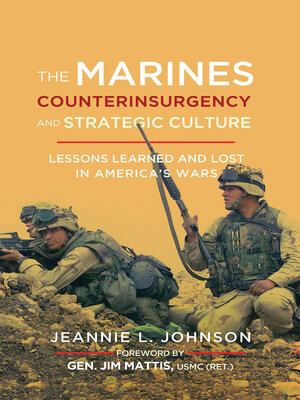The Marines, Counterinsurgency, and Strategic Culture
ebook ∣ Lessons Learned and Lost in America's Wars
By Jeannie L. Johnson

Sign up to save your library
With an OverDrive account, you can save your favorite libraries for at-a-glance information about availability. Find out more about OverDrive accounts.
Find this title in Libby, the library reading app by OverDrive.



Search for a digital library with this title
Title found at these libraries:
| Loading... |
The United States Marine Corps has a unique culture that ensures comradery, exacting standards, and readiness to be the first to every fight. Yet even in a group that is known for innovation, culture can push leaders to fall back on ingrained preferences. Jeannie L. Johnson takes a sympathetic but critical look at the Marine Corps's long experience with counterinsurgency warfare. Which counterinsurgency lessons have been learned and retained for next time and which have been abandoned to history is a story of battlefield trial and error—but also a story of cultural collisions.
The book begins with a fascinating and penetrating look inside the culture of the Marine Corps through research in primary sources, including Marine oral histories, and interviews with Marines. Johnson explores what makes this branch of the military distinct: their identity, norms, values, and perceptual lens. She then traces the history of the Marines' counterinsurgency experience from the expeditionary missions of the early twentieth century, through the Vietnam War, and finally to the Iraq War. Her findings break new ground in strategic culture by introducing a methodology that was pioneered in the intelligence community to forecast behavior. Johnson shows that even a service as self-aware and dedicated to innovation as the Marine Corps is constrained in the lessons-learned process by its own internal predispositions, by the wider US military culture, and by national preferences. Her findings challenge the conclusions of previous counterinsurgency scholarship that ignores culture. This highly readable book reminds us of Sun Tzu's wisdom that to be successful in war, it is important to know thyself as well as the enemy. This is a must-read for anyone interested in the Marines Corps, counterinsurgency warfare, military innovation, or strategic culture.






